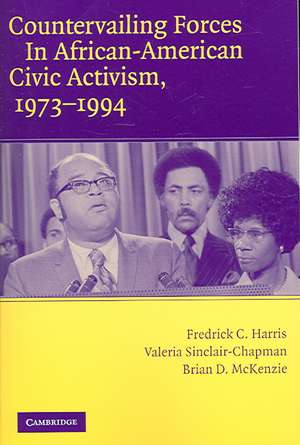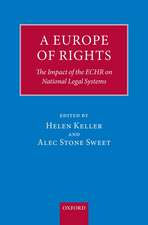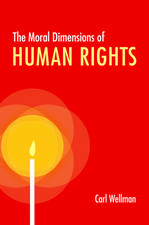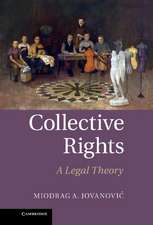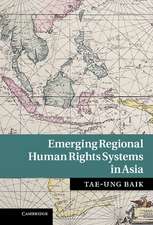Countervailing Forces in African-American Civic Activism, 1973–1994
Autor Fredrick C. Harris, Valeria Sinclair-Chapman, Brian D. McKenzieen Limba Engleză Paperback – 11 dec 2005
| Toate formatele și edițiile | Preț | Express |
|---|---|---|
| Paperback (1) | 205.37 lei 6-8 săpt. | |
| Cambridge University Press – 11 dec 2005 | 205.37 lei 6-8 săpt. | |
| Hardback (1) | 552.94 lei 6-8 săpt. | |
| Cambridge University Press – 18 dec 2005 | 552.94 lei 6-8 săpt. |
Preț: 205.37 lei
Nou
Puncte Express: 308
Preț estimativ în valută:
39.30€ • 40.54$ • 32.79£
39.30€ • 40.54$ • 32.79£
Carte tipărită la comandă
Livrare economică 27 martie-10 aprilie
Preluare comenzi: 021 569.72.76
Specificații
ISBN-13: 9780521614139
ISBN-10: 0521614139
Pagini: 190
Ilustrații: 5 tables
Dimensiuni: 177 x 227 x 10 mm
Greutate: 0.26 kg
Editura: Cambridge University Press
Colecția Cambridge University Press
Locul publicării:New York, United States
ISBN-10: 0521614139
Pagini: 190
Ilustrații: 5 tables
Dimensiuni: 177 x 227 x 10 mm
Greutate: 0.26 kg
Editura: Cambridge University Press
Colecția Cambridge University Press
Locul publicării:New York, United States
Cuprins
1. Introduction; 2. Good times and bad: trends in the economic, social, and political conditions of African Americans in the post-civil rights era; 3. Studying group activism: toward a macro approach to black civic participation; 4. Echoes of black civic activism: historical foundations and longitudinal considerations; 5. Shifting forces: modeling changes in post-civil rights black activism; 6. From margin to center: bringing structural forces into focus in the analysis of black activism.
Recenzii
"It was the best of times, it was the worst of times....'Countervailing Forces is organized around the insights of this cliché, but moves well beyond it. The book focuses our attention on countervailing society-wide forces that together shape civic engagement, and shows how these forces affect politic dynamics over time. It thereby illuminates the ways in which formal and informal public activities grow and shrink, compete and reinforce each other, succeed and fail, in black politics and indeed in all of American politics." Jennifer L. Hochschild, Harvard University
"Countervailing Forces offers a sobering assessment of how economic and political changes over the past decade structure African-American political participation. The historical and empirical analyses are rich, and the authors' conclusions will reframe how minority politics, as well as political behavior, scholars, think about context, empowerment and political participation." Jan Leighley, University of Arizona
"Countervailing Forces is a major achievement. In the post-civil rights era, American democracy faces a profound challenge. While the formal, legal barriers of Jim Crow no longer impede African American political empowerment, deep and enduring economic inequality poses a new obstacle for black civic participation and political equality. With bracing clarity and incisive analysis, Harris, Sinclair-Chapman, and McKenzie address this challenge and reveal both the accomplishments and the limits of the civil rights revolution. No one concerned with the health of American democracy can afford to ignore this book." Robert C. Lieberman, Columbia University
"The manuscript sheds light on a critically important question in black politics how do national political, economic, and social conditions shape black civic and political participation in the post-civil rights era? The book contributes to the question by providing evidence that economic and social distress factors are important predicators of black political involvement from 1973 to 1994. The book moves the literature to consider a collective approach by analyzing the black community instead of an individualistic approach. That is, they use an aggregate-level analysis to estimate how macro-level economic, social and political factors affected black political activity in a twenty-one year time frame.(continued below)
This is a stunning and important movement of the existing literature and the accompanying insights invaluable to our understanding. The core question of their macro model is whether the potential participatory benefits that accrue from black political empowerment outweigh the likely negative effects of economic vulnerability and social distress. The authors make a powerful statement to the black community and a powerful contribution to black politics." Janet M. Box-Steffensmeier, Ohio State University
"This brilliant work is an exceptional piece of scholarship on a rarely considered but highly important and quite interesting topic: how far can political power move a people in a downward spiraling and declining economy? The book contains a persuasive empirical answer. This makes the book significant not only for the current moment in time but historically when African Americans gained political power with the passage of the 15th Amendment in 1870. With such an empirical answer, these young scholars can enter the current public dialogue about the limits of public policy reform with the mere granting of political power." Hanes Walton, Jr., University of Michigan
"Countervailing Forces offers a sobering assessment of how economic and political changes over the past decade structure African-American political participation. The historical and empirical analyses are rich, and the authors' conclusions will reframe how minority politics, as well as political behavior, scholars, think about context, empowerment and political participation." Jan Leighley, University of Arizona
"Countervailing Forces is a major achievement. In the post-civil rights era, American democracy faces a profound challenge. While the formal, legal barriers of Jim Crow no longer impede African American political empowerment, deep and enduring economic inequality poses a new obstacle for black civic participation and political equality. With bracing clarity and incisive analysis, Harris, Sinclair-Chapman, and McKenzie address this challenge and reveal both the accomplishments and the limits of the civil rights revolution. No one concerned with the health of American democracy can afford to ignore this book." Robert C. Lieberman, Columbia University
"The manuscript sheds light on a critically important question in black politics how do national political, economic, and social conditions shape black civic and political participation in the post-civil rights era? The book contributes to the question by providing evidence that economic and social distress factors are important predicators of black political involvement from 1973 to 1994. The book moves the literature to consider a collective approach by analyzing the black community instead of an individualistic approach. That is, they use an aggregate-level analysis to estimate how macro-level economic, social and political factors affected black political activity in a twenty-one year time frame.(continued below)
This is a stunning and important movement of the existing literature and the accompanying insights invaluable to our understanding. The core question of their macro model is whether the potential participatory benefits that accrue from black political empowerment outweigh the likely negative effects of economic vulnerability and social distress. The authors make a powerful statement to the black community and a powerful contribution to black politics." Janet M. Box-Steffensmeier, Ohio State University
"This brilliant work is an exceptional piece of scholarship on a rarely considered but highly important and quite interesting topic: how far can political power move a people in a downward spiraling and declining economy? The book contains a persuasive empirical answer. This makes the book significant not only for the current moment in time but historically when African Americans gained political power with the passage of the 15th Amendment in 1870. With such an empirical answer, these young scholars can enter the current public dialogue about the limits of public policy reform with the mere granting of political power." Hanes Walton, Jr., University of Michigan
Notă biografică
Descriere
This is a study assessing black civic participation after the civil rights movement.
